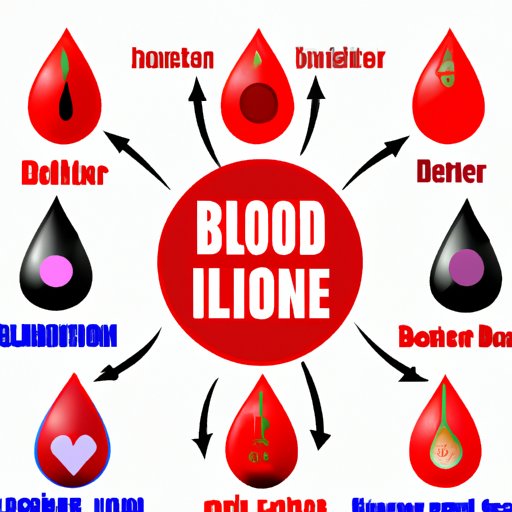
Introduction
Blood is an essential biological fluid that is vital for human life. It circulates throughout the body, delivering oxygen and nutrients to various organs and tissues, and helping to remove waste products. Without blood, we would not be able to survive. In this article, we will discuss the importance of blood, why people need it, its composition, and the benefits of donating blood.
The Importance of Blood Donation: The Life-Saving Gift
Did you know that every two seconds, someone in the United States needs blood? According to the American Red Cross, approximately 36,000 units of red blood cells are needed every day, and a single blood donation can help save up to three lives. Blood transfusions are used for patients who have undergone surgery, are suffering from cancer, or have experienced a traumatic injury. Donating blood is a simple and quick process that can help save lives.
The Science Behind Blood: Understanding the Role of Red Blood Cells, Platelets, and Plasma
Blood is made up of different components, including red blood cells, platelets, and plasma. Red blood cells contain hemoglobin, a protein that carries oxygen to different parts of the body. Platelets help to form blood clots, which are necessary for stopping bleeding. Plasma is a yellowish liquid that contains water, electrolytes, and proteins. It plays a crucial role in maintaining blood pressure and regulating body temperature.
What Happens When You Don’t Have Enough Blood: An Overview of Anemia and Other Blood Disorders
Anemia is a condition that occurs when there is a shortage of red blood cells in the body. Symptoms of anemia include fatigue, weakness, and shortness of breath. Anemia can be caused by a deficiency in iron, vitamin B12, or folate. Other blood disorders include sickle cell anemia, hemophilia, and leukemia. These disorders can affect the body’s ability to produce or clot blood, and can result in serious health complications.
How to Maintain Healthy Blood Levels: Tips for Eating a Balanced Diet and Exercising Regularly
A healthy diet can play a significant role in maintaining healthy blood levels. Iron-rich foods such as spinach, red meat, and seafood can help to increase the production of red blood cells. Vitamin B12 can be found in foods such as eggs, milk, and fish. Exercise is also important for keeping the heart and blood vessels healthy. Regular physical activity can help to improve circulation, increase oxygen delivery to the body, and reduce the risk of developing chronic diseases.
The Role of Blood in Fighting Disease: Exploring the Immune System’s Response to Infection and Illness
Blood plays a crucial role in the body’s immune system. White blood cells, also known as leukocytes, are responsible for fighting off infections and foreign invaders. There are several types of white blood cells, including lymphocytes, monocytes, and granulocytes, each with its unique function. When the body is infected with a virus or bacteria, white blood cells are produced in large numbers to help fight off the infection.
Blood and Surgery: The Essential Role of Blood Transfusions in Medical Procedures
Blood transfusions are an essential part of many medical procedures, including surgery. During surgery, patients may lose significant amounts of blood, and therefore require a transfusion to replace lost blood. Blood transfusions are also used to treat patients with chronic blood disorders, such as sickle cell anemia, where blood cells are deformed and cannot function properly.
Donating Blood: Making a Difference in Your Community and Saving Lives Every Day
Donating blood is a life-saving gift that can help save the lives of people in need. Blood donations are always needed, and the process is simple and safe. Before donating, individuals must meet certain eligibility criteria and pass a health screening. Many blood donation centers also offer incentives for those who donate, such as free health screenings or gift cards.
Conclusion
Blood is essential to life, and understanding its composition and role is crucial for maintaining good health. Donating blood is a simple yet powerful way to help those in need and make a difference in the community. By donating blood, you can help ensure that hospitals and clinics have enough blood to treat patients with life-threatening conditions. So, consider donating blood today and help save a life.





